Last night the eye folks dumped so much dilation fluid into my baby blues that I'm still dilated today. Because of that I can only barely see at close distances, which means that blogging will be slow. I'll return as my pupils slowly get smaller than a trash can lid and I can see again.
Month: April 2022
For a few minutes in January, Republicans wanted to impeach Trump
Huh. I guess the hot ticket for Republicans right after January 6 was to haul out the 25th Amendment and boot Donald Trump out of office:
Recording of McCarthy and Cheney pic.twitter.com/oHMMV7TXbo
— Acyn (@Acyn) April 22, 2022
Halfway through, McCarthy switches gears and tells Liz Cheney: "We know it'll pass the House. I think there's a chance it'll pass the Senate, even when he's gone."
Apparently "it" is articles of impeachment, and McCarthy said he'd advise Trump to resign. Needless to say, McCarthy soon changed his mind and decided that Democrats were such malicious hypocrites that he couldn't support their impeachment of Trump over a minor little boys-will-be-boys roughhousing in the Capitol.
Today, of course, I believe the party line is that Trump single-handedly saved democracy by making Democrats pay for their perfidy, or something. I can't keep it straight. But whatever it is, it's the Democrats' fault.
Florida finally shows us some of their woke mathematics
The Florida Department of Education finally released a few examples of "unacceptable" math problems today. Here is one of them:
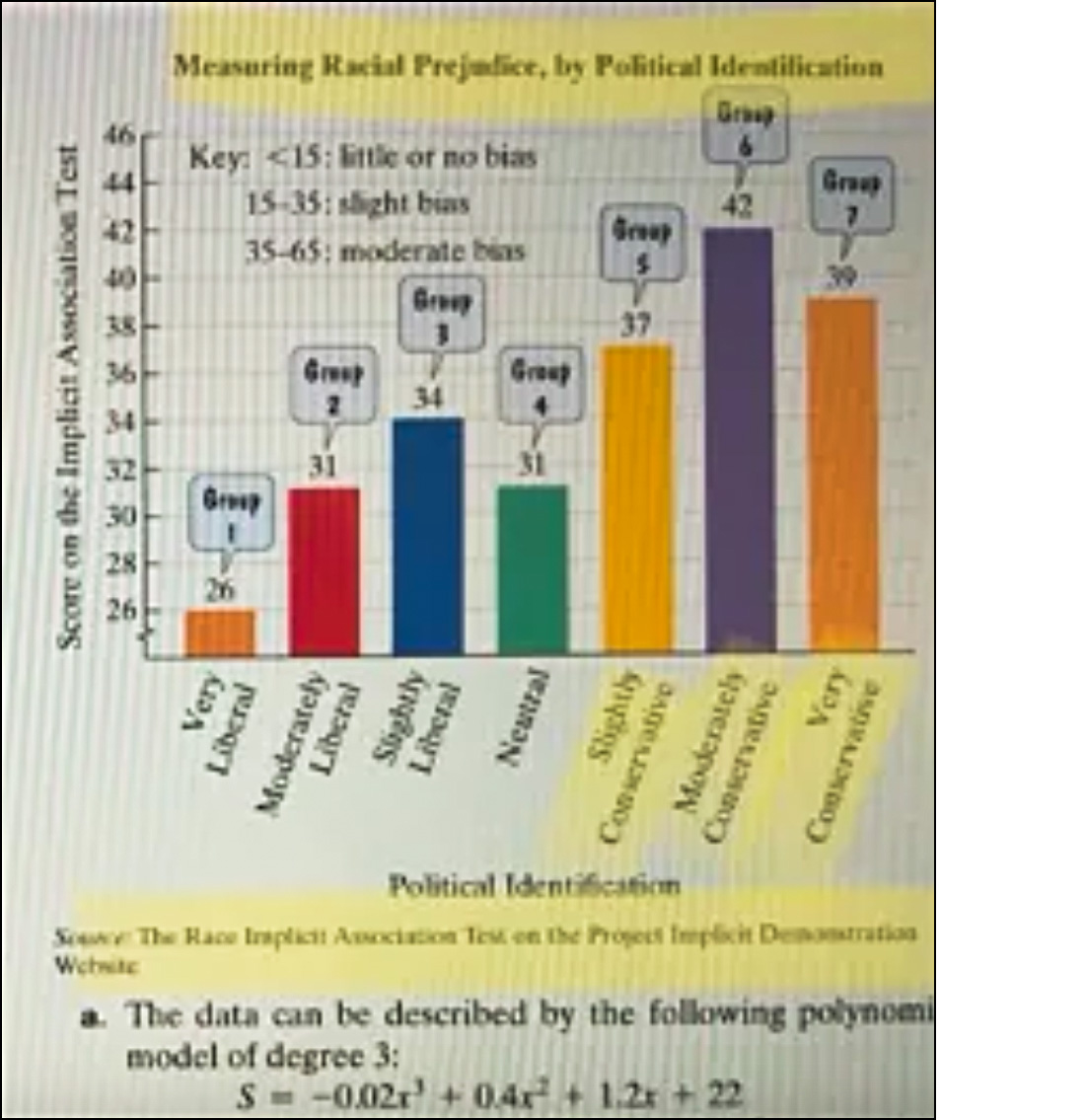 So the lesson here is that conservatives are racist, as proven by a test that's of dubious reliability.
So the lesson here is that conservatives are racist, as proven by a test that's of dubious reliability.
Nice work, textbook people. This is insane. I can't imagine there's a conservative governor anywhere in the country who wouldn't be offended by this. If this math book included a similar bar graph showing crime rates by race, do you think that liberal governors might be equally offended?
For chrissake. How about if we stick to bar charts of smog levels at different hours of the day, or something like that?
Lunchtime Photo
The Republican way of politics is changing
A few weeks ago (?) former Trump lapdog Jared Kushner parachuted into Saudi Arabia hoping to pick up an investment in his new private equity firm. Here's a sample of his pitch deck, which was obtained by The Intercept:
 I had a hard time picking out the most embarrassing slide from the deck and eventually just said the hell with it and went with this one. Even an idiot can see that this diagram says nothing, and the rest of them are like a set of parodies from SNL.
I had a hard time picking out the most embarrassing slide from the deck and eventually just said the hell with it and went with this one. Even an idiot can see that this diagram says nothing, and the rest of them are like a set of parodies from SNL.
Needless to say, the Saudi money men aren't idiots and they had plenty of problems with Kushner's pitch:
Those objections included: “the inexperience of the Affinity Fund management”; the possibility that the kingdom would be responsible for “the bulk of the investment and risk”; due diligence on the fledgling firm’s operations that found them “unsatisfactory in all aspects”; a proposed asset management fee that “seems excessive”; and “public relations risks” from Mr. Kushner’s prior role as a senior adviser to his father-in-law, former President Donald J. Trump, according to minutes of the panel’s meeting last June 30.
But days later the full board of the $620 billion Public Investment Fund — led by Crown Prince Mohammed bin Salman, Saudi Arabia’s de facto ruler and a beneficiary of Mr. Kushner’s support when he worked as a White House adviser — overruled the panel.
This obvious payoff for Kushner's and Trump's loyalty to Saudi interests got a few days notice and then faded out.
Now let's switch to a couple of other warm weather environments: Southern California and Southern Florida. Walt Disney Company, headquartered in the liberal entertainment industry of Los Angeles and under pressure from its workers at Walt Disney World in Orlando, decided to publicly oppose Florida's "Don't Say Gay" bill. There wasn't much to this: they didn't threaten to shut down their business or anything like that. They just issued a statement opposing the bill.
But Gov. Ron DeSantis, a Republican who sees a president every time he looks in the mirror, swore revenge. Like many companies in Florida, Disney enjoys self-governing status over the land on which Walt Disney World sits, called the Reedy Creek Improvement District. This is a convenience for Disney and also a convenience for the counties that surround the land, but no matter. DeSantis wanted to punish Disney by taking away their self-governing status, and so far he's gotten the Florida Senate to agree.
This is all bad enough. But what's really bad is that there are virtually no Republicans who seem to have a problem with either of these things. A $2 billion gift from the Saudis? Whatevs. Kushner deserves it for his 48 months of selfless public service.
And a Republican governor taking official state vengeance against a longtime corporate ally just because they opposed a bill of his? That's flat-out extortion, but once again, no one in the Republican Party seems to care much and media coverage is modest.
What's the deal here? Does no one care? Do they care but they can't figure out a good angle to fight back? Do Democrats think these scandals are losers that won't help them much? Or what?
Is this now just the routine Republican way of politics?
Lunchtime Photo
Superpredators were real. But they aren’t anymore.
In the New York Times today, James Forman Jr. and Kayla Vinson take another shot at the "superpredator" theory of the mid 1990s:
In January the Connecticut Supreme Court reversed the 60-year sentence imposed on Keith Belcher, a Black teenager, for sexual assault and armed robbery committed when he was 14. Mr. Belcher was sentenced in 1997, at the height of the superpredator panic....Judge Michael Hartmere [] said this at Mr. Belcher’s sentencing hearing:
Professor DiIulio of Princeton University has coined the term “superpredator,” which refers to a group of radically impulsive, brutally remorseless youngsters who assault, rape, rob and burglarize. Mr. Belcher, you are a charter member of that group. You have no fears, from your conduct, of the pains of imprisonment, nor do you suffer from the pangs of conscience.
Judge Hartmere then imposed a sentence that could have kept Mr. Belcher incarcerated until his mid-70s....But Mr. Belcher got lucky. Because the trial judge explicitly cited a theory that had been proved wrong (in 2001, Professor DiIulio acknowledged as much), Mr. Belcher’s court-appointed attorneys, Natalie Olmstead and Alexandra Harrington, challenged the sentence on the grounds that it was based on “materially false information.” What could be more false, they asked, than a theory widely disavowed, including by its own author?
I hate to see this. But then again, I also hate to debunk it.
But let's review the whole dreary mess. First off, DiIulio wasn't wrong: The early to mid 1990s represented the peak of crime committed by lead-poisoned teenagers. These kids, through no fault of their own, had gone through childhood with high levels of lead in their bloodstream and this had caused permanent damage to their brains. Among other things, some of them were turned into remorseless predators with little impulse control, little fear of being caught, and a sociopathic indifference toward harming others.
The only thing DiIulio was wrong about was the cause of this wave of superpredators. He saw a rise in their numbers and assumed it would keep rising. What he didn't know was that lead was the real root of the problem and we had already passed peak lead. Over the next few years, as the number of lead-poisoned teenagers declined, both superpredators and violent crime in general would drop steadily. We had fixed the problem years before but we didn't know it.
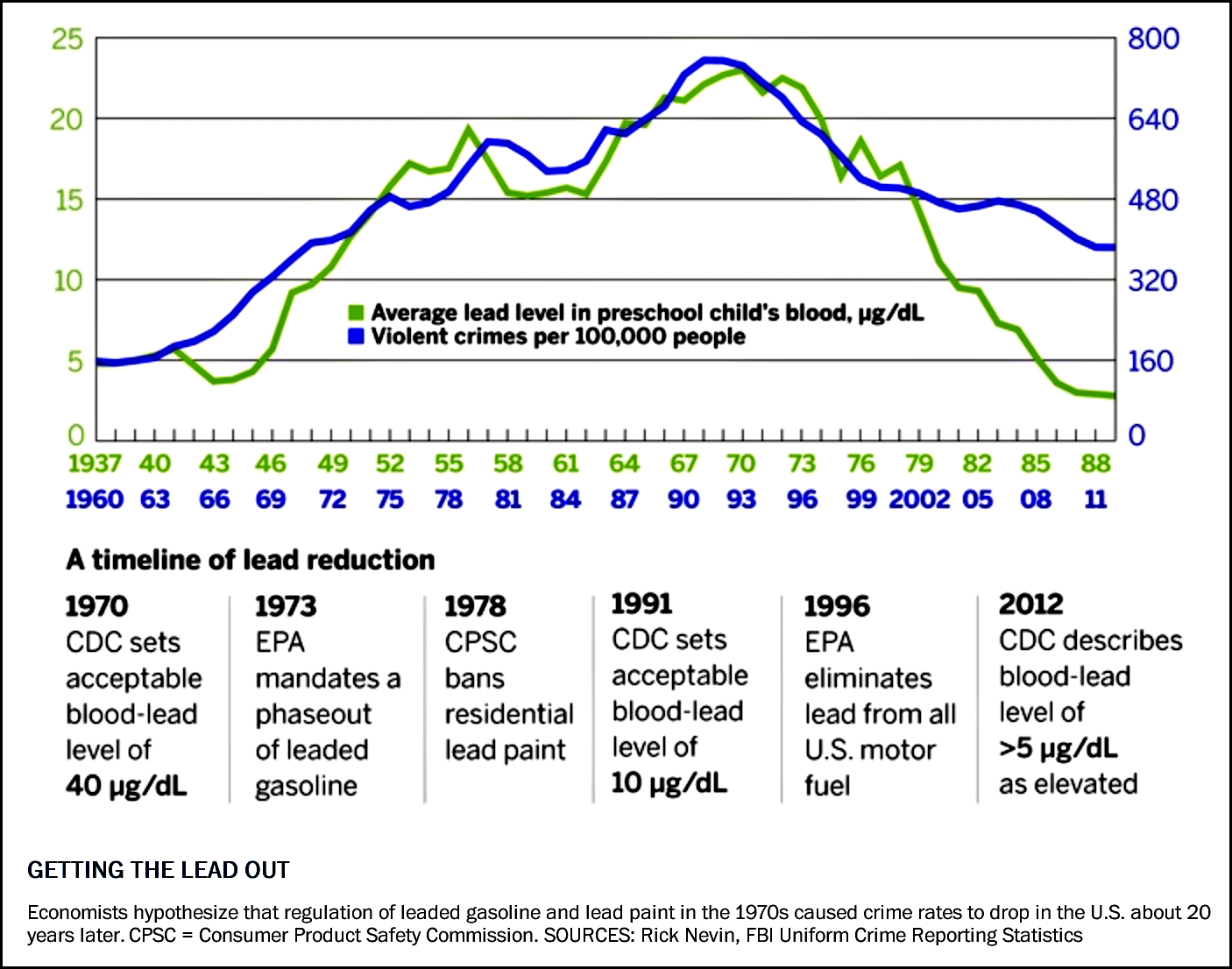 So what about Keith Belcher? I don't know the details of his case, but he probably was a superpredator. And because lead poisoning is permanent, he likely stayed that way for good long time. He may have been given a long sentence for the wrong reason, but there was also a right reason for giving him a long sentence.
So what about Keith Belcher? I don't know the details of his case, but he probably was a superpredator. And because lead poisoning is permanent, he likely stayed that way for good long time. He may have been given a long sentence for the wrong reason, but there was also a right reason for giving him a long sentence.
But this is where things get tricky. Belcher needed a long sentence because he remained dangerous for a long time. Even today, at age 39, we might be taking a bit of a risk by releasing him. It's a very hard question to answer.
What's indisputable, however, is that by the early 2000s the lead-driven crime wave had declined massively. Teenagers and 20-somethings who committed violent crimes may have needed to be locked up, but they weren't uniquely dangerous and their sentences should have been half as long—or less—compared to sentences in the '90s.
But because we've never truly internalized the lesson of lead, we haven't done this. We're still terrified of teenage criminals, and we don't realize that they're far less dangerous than teenage criminals of a few decades ago. Sentences of 10 or 20 or 30 years make no sense for most of them. The most useful criminal justice reform we could make right now would be to cut prison sentences across the board by half or two-thirds. Mass incarceration, like lead poisoning, should be a thing of the past.
When the kids grow up, parents stop working
Today the BLS released the March edition of "Employment Characteristics of Families Summary." I have never noticed this report before and I've never looked at it, but it's basically just what it sounds like. It lists the employment rates of people depending on whether they're married, have kids, and so forth. Here's one chart:
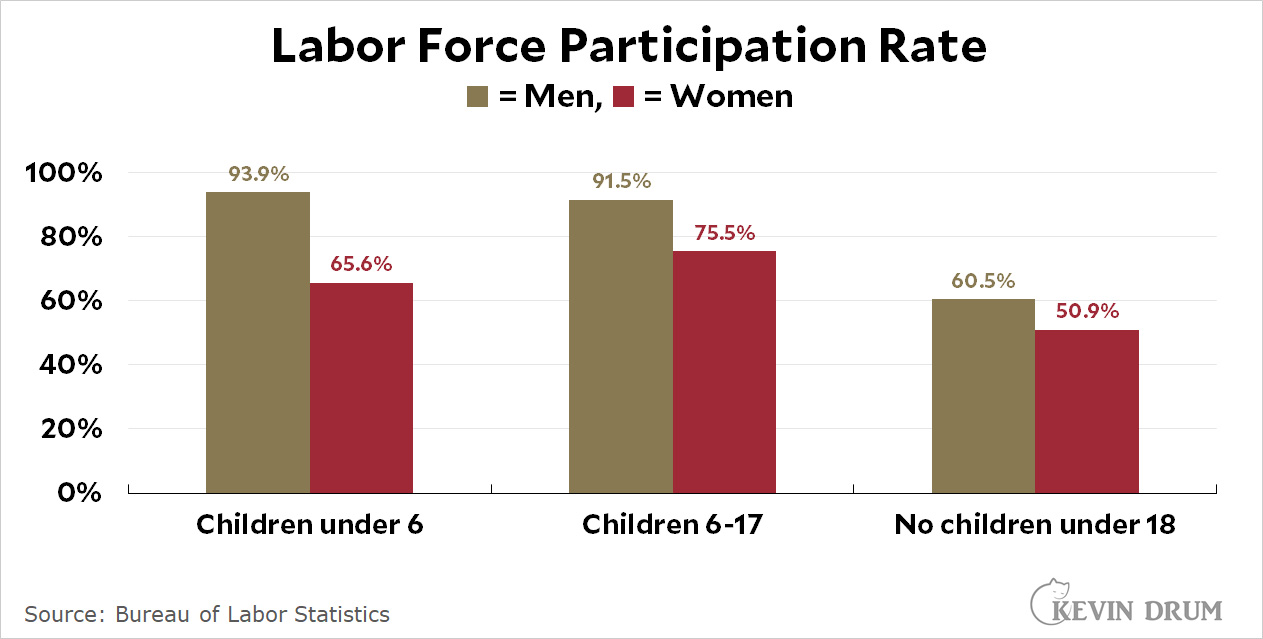 Men with children participate in the labor force at about the same rate no matter how old their children are.
Men with children participate in the labor force at about the same rate no matter how old their children are.
Women with young children participate in the labor force at low levels but many of them return to work when the kids start school.
And among families with no children under 18, labor force participation plunges to 60% for men and 50% for women. This is fascinating. This group doesn't include retirees, so that's not the explanation. However, it probably does include a wide range of ages among the adults, and it's possible that the average doesn't mean a lot.
I'm not sure I understand precisely what's going on here. At face value, it validates the old saw that people work to put food on the table for their kids. Once the kids leave home, a lot of them quit working and live off savings—or something. This is puzzling.
We don’t have a housing shortage
Paul Krugman says the Fed has to raise interest rates in order to get control of inflation:
There is, however, a problem. The Fed’s efforts to control inflation will work mainly through the housing market, driving down sales and construction. Which wouldn’t be so bad if it weren’t for the fact that America hasn’t been building enough houses over the long term.
....What’s going on here? The answer is that after the housing bubble and bust of the 2000s, housing construction plunged and never fully recovered.
I don't get this. It's practically conventional wisdom, and it's true that housing construction plunged in the late 2000s and never returned to its bubble peak. But should it have? That was a bubble peak, after all. Here's a more useful chart showing not construction rates, but total housing available:
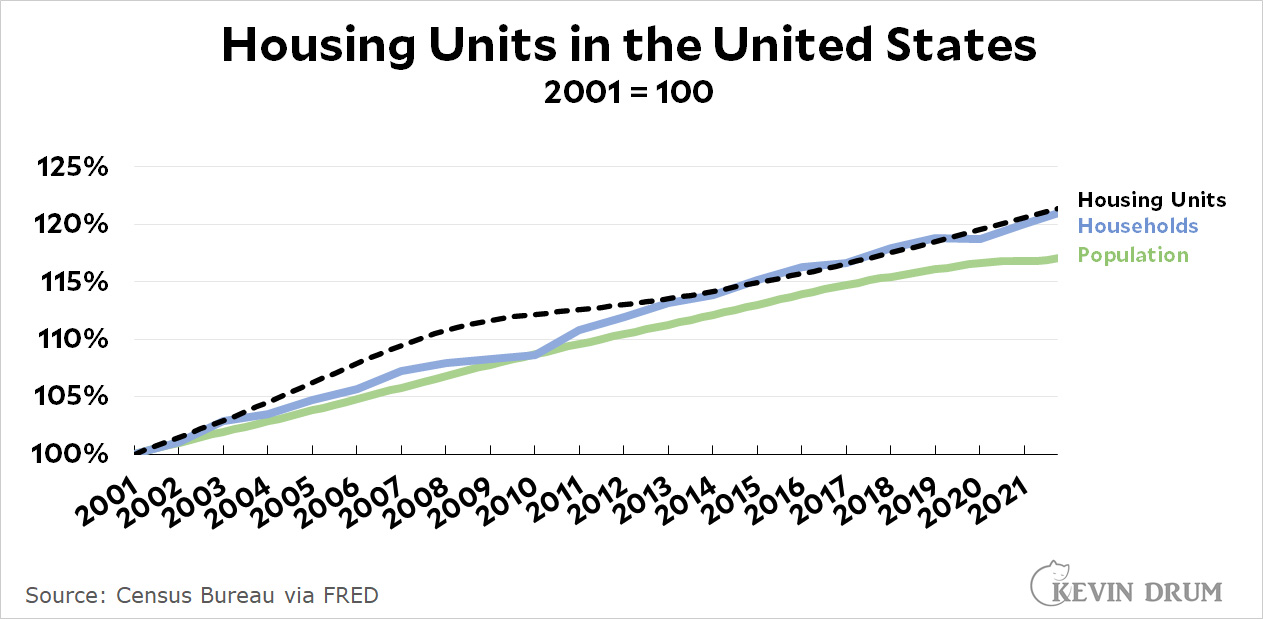 During the early aughts, housing supply grew far faster than population. After the bust, household formation caught up by around 2013, and since then housing supply has matched household growth and has exceeded population growth.
During the early aughts, housing supply grew far faster than population. After the bust, household formation caught up by around 2013, and since then housing supply has matched household growth and has exceeded population growth.
So do we have a housing shortage? Everyone keeps saying we do, and the housing groupies keep yelling at me that my chart is meaningless. But why? It sure looks right to me.
By the way, I was browsing through some OECD stats the other day looking for health care information and I happened to run into their league rankings for housing. Guess how we compare?
 Based on indicators such as rooms per house; basic facilities; and affordability, they rank us #1 in the entire OECD group of rich countries for the year 2020. We must be doing something right.¹
Based on indicators such as rooms per house; basic facilities; and affordability, they rank us #1 in the entire OECD group of rich countries for the year 2020. We must be doing something right.¹
¹And something wrong. According to the OECD, we rank second from last among housing affordability for low-income tenants.
Some notes on social media
Social media hasn't changed behavior, it has revealed it.
The best way of reining in social media is not to rein in what people are allowed to write. It's to give users the ability to decide what they're going to see. The default setting should be something along the lines of "I only want to see civil conversations, please."
Most of the stories about the horrible effects of social media are wildly exaggerated. Recent example here.
China has relentlessly refused to allow access to American social media apps. This means either (a) we should refuse access to Chinese social media apps, or (b) we should view this as a Chinese weakness and not emulate it. I'd vote for (b) but reasonable people can differ about this.
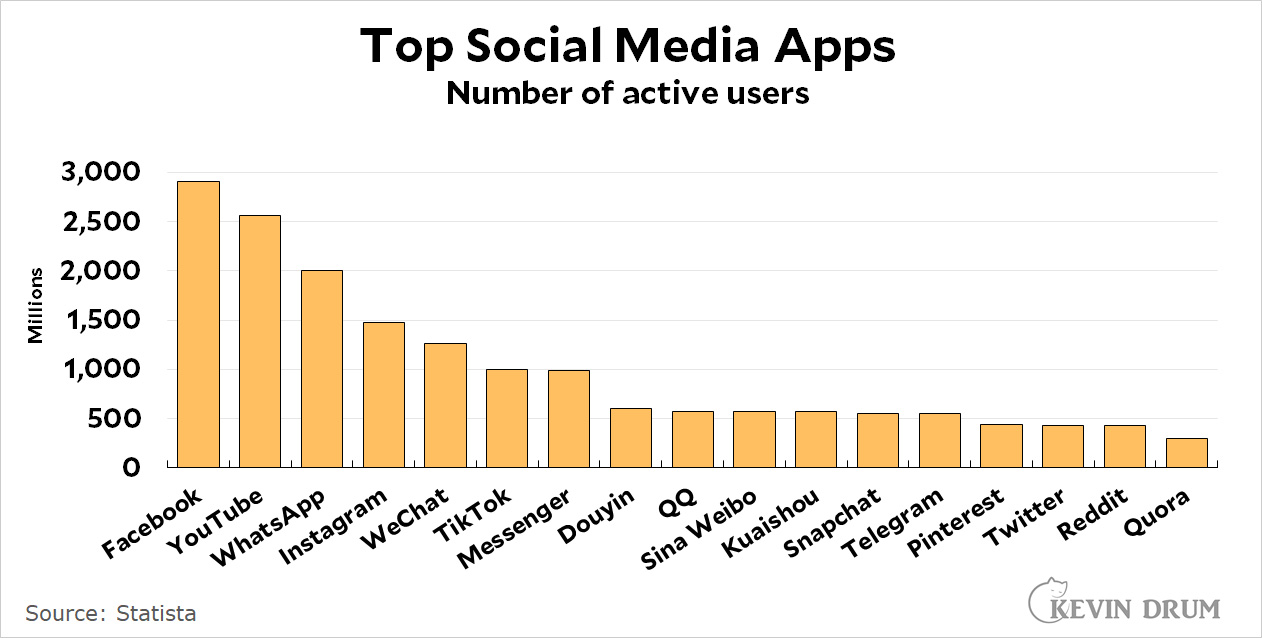 It's worth remembering that politics is only a tiny, tiny percentage of social media. Most of it is gossip, animal videos, TV, food, parenting, fashion, crafting, etc. Serious politics makes up only about 3-4% of social media.
It's worth remembering that politics is only a tiny, tiny percentage of social media. Most of it is gossip, animal videos, TV, food, parenting, fashion, crafting, etc. Serious politics makes up only about 3-4% of social media.
Twitter conversations are almost universally bad thanks to its fundamental design. You should engage with other Twitter users sparingly.
The real cesspool in social media isn't Facebook or Twitter. It's YouTube.
The internet in general makes smart people smarter and dumb people dumber. This is easily explicable: the internet has a tremendous amount of useful information, but it's not easy to access. Smart people can figure out how to do it, and they have the background to figure out which information is reliable and which isn't. Dumb people can do neither, and often end up gathering information that ranges from merely flawed to flat-out conspiracy nonsense.
Social media is a good source of political disinformation, but it's small potatoes compared to Fox News. Keep your eyes on the brass ring, folks.


